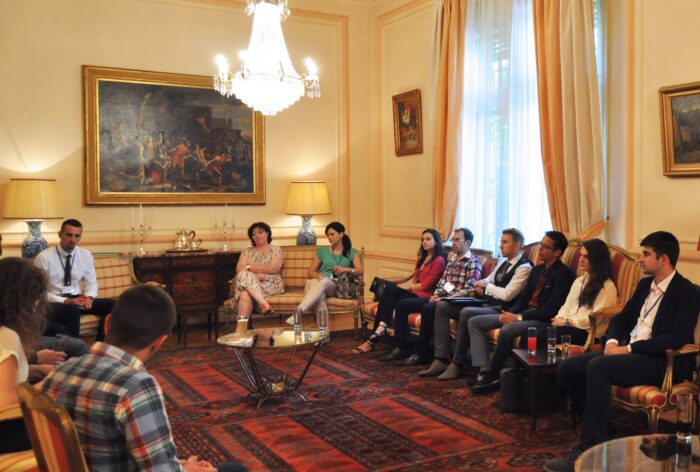International School of Public and Cultural Diplomacy (ISP-CD) was a special event at its first edition, having multiple venues in multicultural surroundings, including institutions, foundations and embassies. Senior diplomats discussed and debated with the participants on the importance of public and cultural diplomacy in different contexts.
This project provided outreach to a youth community of national students aiming to go into a political/diplomacy career following their studies. The project consisted on different lectures, workshops, round tables, on a wide range of topics in order to raise awareness on public and cultural diplomacy goals. The event have been organized over 5 days of activities and took place between 20th and 24th of July 2015.
Every year, ISP-CD is a great opportunity to discover different strategies of promotion in institutions, foundations and embassies, to extend the professional network and to interact with senior diplomats. The event in 2015 was conceived to have multiple venues such as the Romanian Ministry of Foreign Affairs, European Commission Representation to Romania, European Parliament Information Office, Partners for Local Development Foundation and the following embassies: Belgium, Finland, Mexico, Poland, Lebanon, South Africa.
The main concepts of the event are public and cultural diplomacy, defined in many ways over the time, based on different approaches and having multiple interpretations.
Public diplomacy could be defined in many ways and scholars referred over the time to different characteristics such as national branding, public relations, lobbying, cultural relations, strategic communication etc. The actual environment is an increasingly networked world and public diplomacy requires credibility and public consumption. Messaging and listening are two keywords that represent the voice of public diplomacy in the 21st century.
Cultural diplomacy could be defined as a pillar of public diplomacy, a diplomatic kit that includes artistic, cultural and traditional activities of a nation. It is based on an exchange of ideas and information, trying to create a platform for people-to-people contact and to promote shared values and interests, as well as tolerance and confidence.
The project highlighted two important aspects referring to communication and branding in institutions, foundations and embassies:
- firstly, the possibility that public and cultural diplomacy represents “smart power tools” for trust, prosperity and openness in diplomatic interaction;
- second, the evolution of bilateral relations between Romania and the countries involved in the project based on public and cultural diplomacy.

